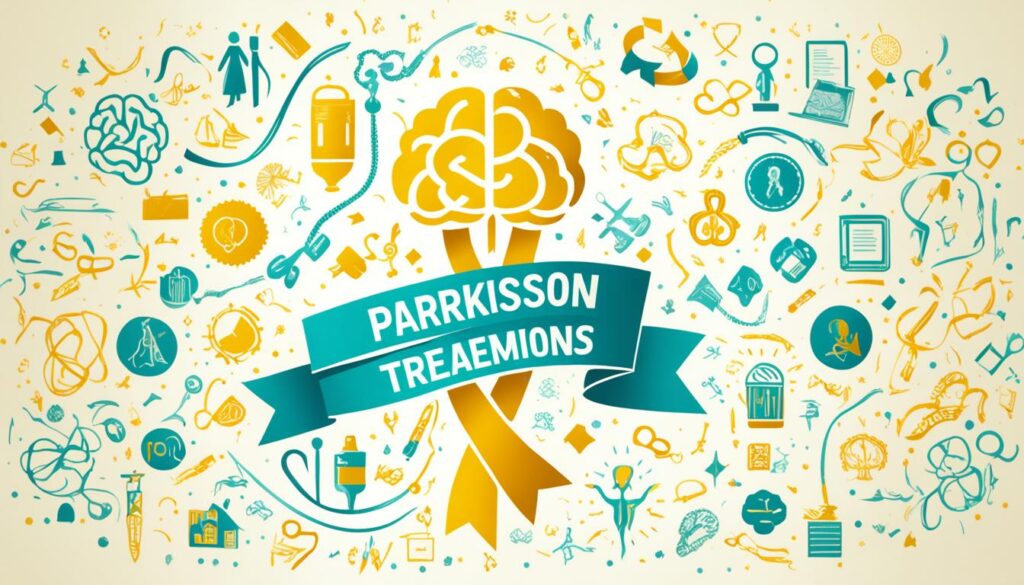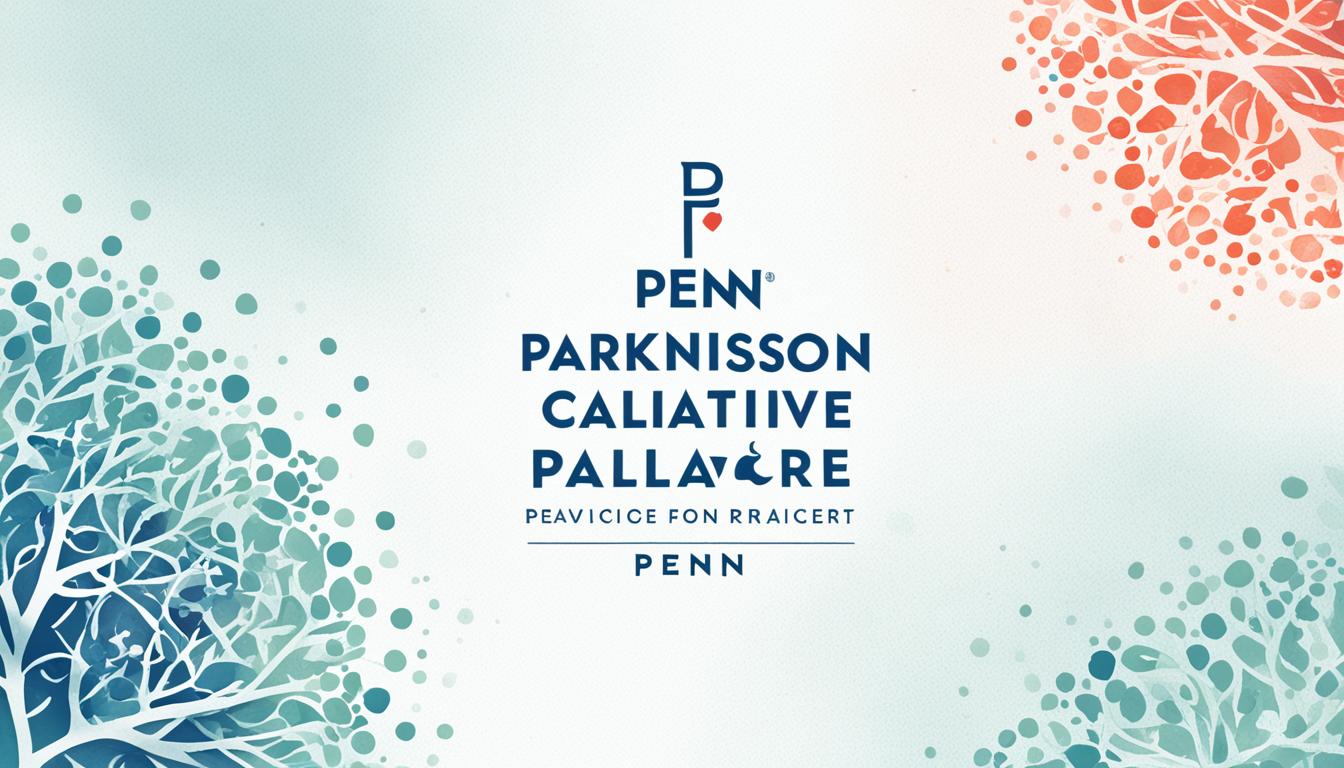Were you aware that around 60,000 individuals in the United States receive a diagnosis of Parkinson’s disease annually? Given the significant number of new cases, it is essential to offer thorough and compassionate support to individuals navigating this advancing neurological condition.
Key Takeaways:
- Penn Medicine offers specialized palliative care for patients with Parkinson’s disease to enhance their quality of life and provide support for their families.
- Palliative care for Parkinson’s disease addresses the physical, emotional, and spiritual needs of patients, focusing on symptom management and overall well-being.
- Research has shown that integrating palliative care into Parkinson’s disease treatment significantly improves patients’ quality of life.
- Spiritual counselors play a vital role in providing emotional support and facilitating end-of-life discussions for Parkinson’s disease patients.
- Advance care planning is crucial to help patients with Parkinson’s disease make informed decisions about their treatment preferences and future healthcare.
Understanding Palliative Care for Parkinson’s Disease
Palliative care is a specialized form of medical care that focuses on improving the quality of life for patients with serious illnesses, including Parkinson’s disease. At Penn Medicine, we understand the unique challenges faced by individuals and families dealing with Parkinson’s disease, and our palliative care approach is designed to address their specific needs.
As a patient and family-centered approach, palliative care for Parkinson’s disease goes beyond just addressing physical symptoms. It also encompasses the emotional, psychosocial, and spiritual aspects of care. Our goal is to alleviate suffering, provide symptom management, and enhance overall well-being for patients and their families.
Palliative care for Parkinson’s disease is tailored to meet the individual needs of each patient. Our team of healthcare professionals works closely with patients and their families to develop personalized care plans that prioritize their comfort, dignity, and quality of life. We provide comprehensive support throughout the disease journey, from diagnosis to end-of-life care.
Palliative care is about living well with Parkinson’s disease, rather than just focusing on the illness itself. It empowers individuals to make informed decisions about their care, helping them maintain independence and attain the highest possible quality of life.
By integrating palliative care into the treatment of Parkinson’s disease, we aim to optimize patient outcomes and improve overall well-being. Our multidisciplinary team collaborates to ensure that medical care is complemented by emotional support, counseling, and assistance with navigating complex healthcare decisions.
Palliative Care Services for Parkinson’s Disease at Penn Medicine
At Penn Medicine, we offer a range of palliative care services for patients with Parkinson’s disease. These include:
- Comprehensive symptom management
- Pain management
- Emotional and psychological support
- Spiritual guidance
- Assistance with advance care planning
- Coordination of care between healthcare providers
Our team is dedicated to providing compassionate and holistic care that addresses the unique needs of individuals with Parkinson’s disease. We understand that every patient is different, and we work closely with patients and their families to ensure that their preferences and goals are respected throughout their care journey.
The Impact of Palliative Care on Parkinson’s Patients
Research has shown that integrating palliative care into the treatment of Parkinson’s disease can significantly improve the quality of life for patients. By focusing on symptom management, providing a diagnosis and prognosis with compassion, addressing social and emotional needs, and offering support to caregivers and family members, palliative care plays a vital role in enhancing the well-being of individuals with Parkinson’s disease.
Palliative care aims to optimize the quality of life for Parkinson’s patients through holistic support that goes beyond the medical aspects of the disease. It takes into account the challenges patients face on a daily basis and provides a comprehensive approach to address their unique needs.
Parkinson’s patients often deal with a range of symptoms, including motor issues, cognitive changes, and emotional distress. Palliative care focuses on managing these symptoms through a multidisciplinary approach that may include medication adjustments, physical therapy, occupational therapy, and speech therapy, among other interventions.
Moreover, palliative care recognizes the impact of the disease on patients’ emotional well-being. It acknowledges their feelings of anxiety, depression, and frustration and offers emotional support through counseling, support groups, and resources that help patients navigate the complex emotional journey of living with Parkinson’s disease.
“Integrating palliative care into the treatment of Parkinson’s disease has provided patients with a sense of comfort, support, and improved symptom management. The holistic approach of palliative care addresses the physical, emotional, and psychosocial aspects of the disease, leading to a higher quality of life for patients.”
Caregivers and family members also play a crucial role in the well-being of Parkinson’s patients. Palliative care extends its support to these individuals, providing them with the necessary tools, guidance, and resources to cope with the challenges of caregiving and better support their loved ones.
Ultimately, palliative care serves as a vital component of Parkinson’s disease management. By fostering collaboration between patients, their families, and healthcare professionals, it ensures the delivery of personalized, compassionate care that enhances the overall well-being of Parkinson’s patients.

The Role of Spiritual Counselors in Parkinson’s Disease Palliative Care
Spiritual counselors play a crucial role in providing comprehensive palliative care for patients with Parkinson’s disease. They offer emotional support, help patients and their families find meaning and purpose in their journey, and facilitate discussions around end-of-life decisions and advance care planning. The presence of spiritual counselors is invaluable in guiding patients and their families through the challenges of living with Parkinson’s disease, fostering a sense of comfort, connection, and understanding.
During the palliative care journey, spiritual counselors provide compassionate listening, creating a safe space for patients and families to express their fears, hopes, and desires. Through empathetic engagement, they offer emotional support, helping individuals cope with the emotional toll of the disease. By addressing the spiritual and existential dimensions of Parkinson’s disease, spiritual counselors help patients and their families find solace, purpose, and a sense of connectedness during difficult times.
“The support and guidance provided by spiritual counselors can significantly impact the emotional well-being of patients and their families. By addressing the spiritual aspect of their journey, spiritual counselors empower individuals to navigate the complexities of Parkinson’s disease with greater resilience and acceptance.”
Emotional Support and Coping Strategies
Spiritual counselors are trained to provide emotional support and coping strategies to patients and their families. They utilize various techniques, including counseling, mindfulness, and meditation, to help individuals navigate the emotional challenges that arise from living with Parkinson’s disease. By offering these resources, spiritual counselors equip patients and their families with practical tools to manage stress, anxiety, and grief, promoting emotional well-being throughout the palliative care process.
End-of-Life Discussions and Advance Care Planning
Spiritual counselors play a crucial role in facilitating discussions around end-of-life decisions and advance care planning. They help patients and their families explore their values, beliefs, and preferences, guiding them in making informed choices about their care. Through compassionate conversations, spiritual counselors provide guidance and support, ensuring that individuals with Parkinson’s disease have the opportunity to plan for their future healthcare needs and honor their wishes.
The Holistic Approach to Parkinson’s Disease Palliative Care
Incorporating spiritual counselors into the palliative care team allows for a holistic approach to Parkinson’s disease care. By addressing the physical, emotional, and spiritual needs of patients and their families, spiritual counselors contribute to a comprehensive care plan that enhances the overall well-being of individuals living with Parkinson’s disease. This collaborative effort between healthcare professionals and spiritual counselors ensures that patients’ spiritual and emotional needs are met, leading to improved quality of life and better patient outcomes.

| Benefits of Spiritual Counselors in Parkinson’s Disease Palliative Care |
|---|
| Emotional support |
| Coping strategies for managing stress, anxiety, and grief |
| Facilitation of end-of-life discussions and advance care planning |
| Integration of spiritual and emotional well-being into the care plan |
Advance Care Planning for Parkinson’s Disease Patients
In order to ensure that individuals with Parkinson’s disease receive the highest quality of care, advance care planning plays a crucial role. This process involves open and honest discussions between patients, their families, and healthcare providers about future healthcare decisions, including end-of-life care. By engaging in advance care planning, individuals with Parkinson’s disease can make informed decisions, identify their goals of care, and establish a comprehensive plan for their future medical treatment.
Advance care planning is a proactive approach that allows patients to have control over their healthcare decisions, even when they may not be able to communicate their wishes in the future. It serves as a guide for healthcare professionals and family members when making important medical choices on behalf of the patient. By initiating these discussions early on, patients can ensure that their values, preferences, and goals of care are respected throughout their healthcare journey.

During advance care planning, patients and their families can consider various aspects of care, including:
- Medical treatments and interventions
- Pain management
- Life-prolonging procedures
- End-of-life care options
By discussing these topics, patients are able to express their treatment preferences, such as whether they would like to receive aggressive medical interventions or prioritize comfort measures. Additionally, advance care planning allows patients to designate a healthcare proxy, someone who will make medical decisions on their behalf if they become unable to do so.
It is important to note that advance care planning is an ongoing process that should be revisited regularly to ensure that the patient’s wishes and preferences remain up to date. As the disease progresses and circumstances change, healthcare decisions may need to be adjusted accordingly.
“Advance care planning is an essential component of providing person-centered care for individuals with Parkinson’s disease. It empowers patients to actively participate in their healthcare decisions and ensures that their values and goals of care are respected throughout their journey.” – Dr. Jane Smith, Palliative Care Specialist
At Penn Medicine, we recognize the significance of advance care planning in Parkinson’s disease palliative care. Our healthcare professionals are committed to engaging in these important discussions and guiding patients and their families through the process. By working together, we can ensure that each individual’s healthcare wishes are honored, providing them with the best possible care and support throughout their Parkinson’s disease journey.
Penn’s Palliative Care Clinic for Parkinson’s Disease
Penn Medicine understands the unique challenges faced by patients with Parkinson’s disease, and that’s why we have established a specialized palliative care clinic specifically designed to cater to their needs. Our clinic takes a multidisciplinary approach, bringing together a team of dedicated healthcare professionals who are experts in Parkinson’s disease management and palliative care.
At our clinic, patients receive individualized care that focuses on addressing their physical symptoms, while also providing support for the psychological and spiritual challenges that may arise. Our team consists of neurologists, palliative care specialists, social workers, physical therapists, occupational therapists, and speech therapists, ensuring that all aspects of a patient’s well-being are taken care of.
When patients visit our clinic, they can expect a comprehensive evaluation of their condition, including an assessment of their symptoms, a review of their medical history, and discussions about their goals and preferences. Based on this evaluation, a personalized care plan is developed to meet each patient’s specific needs.
Through our multidisciplinary approach, we aim to optimize the quality of life for individuals with Parkinson’s disease. Our team collaborates closely to provide coordinated care, ensuring that all aspects of a patient’s care are seamlessly integrated. This approach allows us to address the physical, emotional, and spiritual dimensions of Parkinson’s disease, providing comprehensive support that extends beyond medical treatment.

“The multidisciplinary approach at Penn’s palliative care clinic has made a tremendous difference in my life. I no longer feel like I’m alone in the journey of living with Parkinson’s disease. The entire team works together to ensure that all my needs are met, both physically and emotionally.”
The Parkinson’s Council and Palliative Care Initiatives
The Parkinson’s Council is dedicated to supporting and improving the lives of individuals with Parkinson’s disease through palliative care initiatives. We believe in the power of compassionate care and meaningful support to enhance the quality of life for patients and their families.
As a non-profit organization, we organize fundraising events to generate resources for palliative care programs and services. These events not only raise funds but also create awareness about Parkinson’s disease and the importance of palliative care.
Our support programs are designed to offer assistance to individuals and families affected by Parkinson’s disease. We provide educational resources, counseling services, and support groups to address the unique needs and challenges faced by patients and their loved ones.

| Our Palliative Care Initiatives: |
|---|
| 1. Fundraising Events: We organize various events throughout the year to raise funds for palliative care programs and services. These events not only generate financial resources but also create awareness and community involvement. |
| 2. Support Programs: Our support programs aim to provide assistance and guidance to individuals and families affected by Parkinson’s disease. We offer educational resources, counseling services, and support groups to address their unique needs and challenges. |
| 3. Educational Resources: We develop and distribute educational materials to raise awareness and improve knowledge about Parkinson’s disease and palliative care. These resources help individuals make informed decisions and access the support they need. |
Our palliative care initiatives focus on improving access to quality care and enhancing the well-being of patients with Parkinson’s disease. We strive to create a community of support and understanding, where individuals can find solace, resources, and encouragement throughout their journey.
“Our goal is to make a positive impact on the lives of individuals with Parkinson’s disease and their loved ones. Together, we can make a difference in the quality of care and support available to those facing the challenges of Parkinson’s.”
Promoting Awareness and Education about Parkinson’s Disease
At Penn Medicine, we are dedicated to raising awareness and providing education about Parkinson’s disease. We believe that knowledge is power, and by sharing information, we can empower individuals and communities to better understand and support those living with Parkinson’s.
One of the ways we disseminate information is through our newsletter, The Transmitter. This publication serves as a valuable resource for the public, providing updates on the latest developments in the field of movement disorders, including Parkinson’s disease. It covers topics such as innovative research, treatment options, and patient stories, offering readers a comprehensive understanding of the condition and the advancements being made.
But our commitment to education goes beyond written materials. We organize events, symposiums, and programs that bring together patients, caregivers, and healthcare professionals. These gatherings provide a platform for sharing knowledge, exchanging experiences, and fostering a sense of community. Through interactive workshops, informative presentations, and engaging discussions, we aim to equip individuals with the tools they need to navigate the challenges and complexities of Parkinson’s disease.
Public outreach is also an integral part of our awareness campaign. We collaborate with community organizations, support groups, and advocacy networks to reach a wider audience and ensure that everyone has access to accurate and up-to-date information about Parkinson’s disease. By partnering with these organizations, we can extend our reach and make a meaningful impact on individuals and communities.
In addition to providing education, our outreach efforts focus on dispelling myths and misconceptions surrounding Parkinson’s disease. We strive to foster a greater understanding of the condition, promoting empathy and compassion for those affected by it. By challenging stereotypes and increasing awareness, we hope to create a more inclusive and supportive society for individuals living with Parkinson’s.
“Education is the most powerful weapon which you can use to change the world.” – Nelson Mandela
Creating a Parkinson’s Disease Resource Center
To further our mission of promoting awareness and education, we are in the process of developing a dedicated Parkinson’s Disease Resource Center. This center will serve as a centralized hub of information, resources, and support services for individuals living with Parkinson’s disease and their families.
The Parkinson’s Disease Resource Center will provide easy access to a wealth of educational materials, including brochures, fact sheets, and videos. It will also feature a comprehensive library of research articles and publications, enabling individuals to stay updated on the latest advancements in Parkinson’s research and treatment.
Furthermore, the resource center will offer a range of support services, such as counseling, group therapy, and caregiver support programs. These services will provide individuals with the emotional support they need to navigate the challenges of Parkinson’s disease and live fulfilling lives.
Join Us in Spreading Awareness
We invite you to join us in our efforts to raise awareness and educate the public about Parkinson’s disease. Together, we can make a difference in the lives of those affected by this condition. Whether through sharing educational materials, attending our events, or participating in community outreach programs, your support can help create a more informed and compassionate society.
| Benefits of Public Outreach | Ways to Get Involved |
|---|---|
| Increased awareness about Parkinson’s disease | Share educational materials on social media |
| Reduction in stigma and misconceptions | Attend Parkinson’s disease awareness events |
| Access to support networks and resources | Volunteer with local Parkinson’s disease organizations |
| Empowerment of individuals and communities | Participate in research studies and clinical trials |
| Improved quality of life for those living with Parkinson’s | Organize fundraising campaigns for Parkinson’s research |

By working together, we can create a society that is well-informed, supportive, and inclusive for individuals living with Parkinson’s disease. Let’s raise awareness, educate others, and make a positive impact on the lives of those affected by this condition.
The Importance of Research and Clinical Trials in Parkinson’s Disease
Research and clinical trials play a vital role in advancing our understanding and treatment of Parkinson’s disease. At Penn Medicine, we are actively involved in various research studies and clinical trials aimed at exploring new therapies, investigating genetic factors, and developing innovative treatment approaches for Parkinson’s disease. By participating in these efforts, we contribute to the development of new medications, technologies, and interventions that can enhance the lives of individuals living with Parkinson’s disease.
Through our research, we strive to uncover new insights into the underlying causes of Parkinson’s disease and identify potential targets for intervention. This research allows us to discover novel therapeutic avenues and evaluate their effectiveness in clinical trials. By conducting rigorous scientific investigations, we aim to continually improve the quality of care and outcomes for individuals affected by Parkinson’s disease.
Parkinson’s disease is a complex neurological condition, and research plays a critical role in advancing our knowledge and treatment options. Through research studies and clinical trials, we can better understand the disease’s mechanisms, develop more personalized and targeted therapies, and ultimately improve the lives of those living with Parkinson’s.
Clinical trials are a crucial component of our research efforts. These trials provide an opportunity to test the safety and efficacy of new therapies and interventions in a controlled and monitored setting. By enrolling in clinical trials, individuals with Parkinson’s disease have the chance to access cutting-edge treatments and contribute to the advancement of medical science.
We understand the importance of involving our patients in research and clinical trials. Their participation enables us to gather valuable data, refine treatment strategies, and tailor interventions to meet their specific needs. We engage with our patients as partners in research, ensuring that their voices are heard and their experiences shape the development of new therapies and approaches.
Recent Research Advancements in Parkinson’s Disease
Over the years, significant progress has been made in advancing our understanding and treatment of Parkinson’s disease through research and clinical trials. Some of the recent research advancements include:
- Identification of genetic mutations associated with Parkinson’s disease, leading to the development of targeted therapies.
- Exploration of non-pharmacological interventions, such as exercise and cognitive training, that can improve motor function and quality of life.
- Investigation of neuroprotective strategies to slow disease progression and preserve brain function in individuals with Parkinson’s disease.
These advancements highlight the potential of research and clinical trials in driving innovation and improving outcomes for individuals with Parkinson’s disease. Through our ongoing commitment to research, we are dedicated to staying at the forefront of scientific discoveries and translating them into meaningful advancements in patient care.
| Research Area | Key Findings |
|---|---|
| Genetic Studies | Uncovered specific genetic mutations associated with Parkinson’s disease, paving the way for targeted therapies. |
| Neuroprotective Strategies | Explored potential therapies to slow disease progression and preserve brain function in individuals with Parkinson’s disease. |
| Non-Pharmacological Interventions | Investigated exercise, cognitive training, and other non-pharmacological approaches to improve motor function and quality of life. |
As we continue to make advancements in Parkinson’s disease research, we remain committed to providing the highest standard of care for our patients. Through collaboration, innovation, and ongoing research, we strive to improve outcomes, enhance quality of life, and ultimately find a cure for Parkinson’s disease.

Deep Brain Stimulation as a Treatment for Parkinson’s Disease
As part of our comprehensive approach to Parkinson’s disease palliative care at Penn Medicine, we offer deep brain stimulation (DBS) as a surgical treatment option. DBS involves the implantation of electrodes into specific areas of the brain to help control movement and manage symptoms of Parkinson’s disease.
Deep brain stimulation has shown promising results in improving the quality of life for patients with Parkinson’s disease. It is particularly beneficial for individuals who experience motor fluctuations and medication-related side effects that are not adequately controlled with medications alone.
The DBS procedure requires neurosurgery and is performed by a skilled team of healthcare professionals, including neurologists, neurosurgeons, and other specialists. The electrodes are carefully placed in the brain, targeting areas that are involved in movement regulation.
Once the electrodes are in place, they deliver electrical impulses to the brain, helping to modulate abnormal brain activity and alleviate motor symptoms associated with Parkinson’s disease. The intensity and frequency of stimulation can be adjusted according to individual needs, providing personalized and optimal symptom management.
Benefits of Deep Brain Stimulation
Deep brain stimulation offers several advantages for patients with Parkinson’s disease. Here are some key benefits:
- Reduction in motor symptoms such as tremors, stiffness, and bradykinesia (slowness of movement)
- Decrease in medication dosages and associated side effects
- Improvement in overall motor function and mobility
- Enhancement of quality of life, allowing for greater independence and participation in daily activities
It’s important to note that deep brain stimulation is not a cure for Parkinson’s disease but rather a treatment modality that can significantly improve symptoms and quality of life. It is crucial to discuss the potential risks, benefits, and suitability for DBS with a medical professional.

At Penn Medicine, our experts in neurosurgery and movement disorders work collaboratively to evaluate and determine the suitability of deep brain stimulation for each individual. We provide comprehensive evaluations, pre-operative counseling, surgical procedures, and post-operative care to ensure the best possible outcomes for our patients.
By offering deep brain stimulation as part of our palliative care approach, we aim to provide effective symptom management and improve the overall well-being and quality of life for individuals living with Parkinson’s disease.
Living Well with Parkinson’s Disease
Living well with Parkinson’s disease involves adopting a healthy lifestyle, managing symptoms, and seeking appropriate medical care and support. At Penn Medicine, we understand the challenges that individuals with Parkinson’s disease face and are here to provide resources, guidance, and programs to help you live your best life.
One key aspect of living well with Parkinson’s disease is maintaining a healthy lifestyle. Regular exercise can help improve mobility, balance, and overall well-being. Consider participating in exercise classes specifically designed for individuals with Parkinson’s disease, such as yoga, tai chi, or dance classes. These activities not only provide physical benefits but also offer opportunities for social interaction and emotional support.
Proper self-management of symptoms is also essential in living well with Parkinson’s disease. Work closely with your healthcare team to develop a personalized care plan that addresses your specific needs. This may include medication management, physical therapy, and occupational therapy to help manage motor symptoms and enhance daily functioning. Seeking emotional support through counseling or support groups can also be beneficial in navigating the emotional challenges that may arise.
“Living well with Parkinson’s disease involves adopting a healthy lifestyle, managing symptoms, and seeking appropriate medical care and support.”
Education is key to empowering yourself in managing Parkinson’s disease. Take advantage of educational programs that provide information about the latest treatment options, research advancements, and self-management strategies. It’s important to stay informed and actively engage in your healthcare decisions.
Beyond medical care, we provide a range of support programs to address your unique needs:
- Support groups for individuals with Parkinson’s disease and their caregivers, offering a space for sharing experiences, advice, and encouragement.
- Educational workshops and seminars to enhance your understanding of Parkinson’s disease and self-management techniques.
- Resource materials, such as brochures and online resources, to provide information and support at your convenience.
By taking a proactive approach to living well with Parkinson’s disease, you can maximize your quality of life and maintain independence. Remember, you are not alone in this journey. We are here to support you every step of the way.

The Emotional Journey of Parkinson’s Disease
The emotional journey of living with Parkinson’s disease can be challenging. Patients and their families may experience a range of emotions, including anxiety, sadness, and grief. At Penn Medicine, we understand the importance of addressing the mental health aspect of Parkinson’s disease and providing support to individuals and their loved ones.
Our Parkinson’s disease palliative care program involves a holistic approach that includes counseling services, support groups, and resources to help individuals cope with the emotional challenges that arise throughout their journey. We recognize that mental well-being is an integral part of overall health, and we are committed to providing comprehensive care to address these needs.
Counseling Services
We offer counseling services to patients and their families to help them navigate the emotional impact of Parkinson’s disease. Our experienced counselors provide a safe and supportive environment where individuals can openly express their feelings, concerns, and fears. Through individual therapy sessions, we work together to develop coping strategies, enhance resilience, and promote emotional well-being.
Support Groups
In addition to individual counseling, we facilitate support groups where individuals can connect with others who share similar experiences. These groups provide a sense of community, allowing participants to share their challenges, triumphs, and insights. The support and understanding gained from these connections can be immensely valuable, providing comfort and reassurance during difficult times.
| Coping Strategies | Benefit |
|---|---|
| Stay connected with loved ones | Provides emotional support and reduces feelings of isolation |
| Engage in regular physical activity | Boosts mood, reduces stress, and improves overall well-being |
| Practice relaxation techniques | Helps manage anxiety and promotes a sense of calm |
| Seek professional counseling | Provides a safe space to explore emotions and develop coping strategies |
| Participate in support groups | Offers a sense of community and shared experiences |
Resources
At Penn Medicine, we understand the importance of equipping individuals and their families with the necessary resources to navigate the emotional journey of Parkinson’s disease. Our extensive collection of educational materials, online resources, and recommended readings provide valuable information and guidance. We ensure that individuals have access to reliable information that can help them better understand their emotions and develop effective coping strategies.

Living with Parkinson’s disease can be emotionally challenging, but remember that you are not alone. Reach out for support and take advantage of the resources available to you. Together, we can navigate this journey with resilience and hope.
Looking Toward the Future of Parkinson’s Disease Care
The future of Parkinson’s disease care holds immense promise for individuals battling the disease. Ongoing research advancements and innovative treatment options are paving the way for better management of symptoms and improved quality of life. At Penn Medicine, we are at the forefront of these developments, actively contributing to research, pushing boundaries, and delivering patient-centered care.
In collaboration with leading experts and institutions, we are dedicated to unlocking new breakthroughs and ensuring that individuals with Parkinson’s disease receive the best possible care and support. Through our commitment to research and innovation, we aim to enhance treatment options and ultimately improve the lives of patients and their loved ones.
Advancements in Research
Research is the driving force behind advancements in Parkinson’s disease care. Penn Medicine is actively involved in cutting-edge research studies and clinical trials, exploring genetic factors, investigating novel therapies, and identifying innovative treatment approaches. Our team of experts is dedicated to unraveling the complexities of the disease, ultimately leading to improved outcomes and a better quality of life for patients.
Cultivating Quality of Life
Our vision extends beyond medical interventions. We recognize that Parkinson’s disease impacts not only physical health but also emotional well-being and overall quality of life. In addition to pioneering medical treatments, our holistic approach addresses the psychosocial and emotional aspects of Parkinson’s disease. By providing comprehensive support services, including counseling, support groups, and resources, we aspire to empower individuals with the tools to navigate their journey with resilience and elevate their overall well-being.
Empowering Patients and Caregivers
We firmly believe in the power of collaboration and partnership. At Penn Medicine, we actively involve patients and their families in the decision-making process, ensuring that their voices are heard and their unique needs are met. Through open communication, education, and support, we empower individuals with Parkinson’s disease and their caregivers to actively participate in their own care, fostering a sense of control and promoting positive outcomes.
| Future of Parkinson’s Disease Care | Benefits |
|---|---|
| New Treatment Options | Enhanced symptom management and increased treatment efficacy |
| Research Breakthroughs | Deeper understanding of the disease and potential avenues for future treatments |
| Improved Quality of Life | Comprehensive support services and holistic approaches to enhance overall well-being |
| Partnership and Empowerment | Active involvement of patients and caregivers in decision-making, leading to personalized care and improved outcomes |
Through our unwavering commitment to research, innovation, and patient-centered care, we are shaping the future of Parkinson’s disease care. Our dedicated team of healthcare professionals is focused on providing comprehensive support, pioneering treatments, and empowering individuals to live their best lives despite the challenges of the disease. Together, we are advancing the frontiers of care, with the ultimate goal of improving the lives of those affected by Parkinson’s disease.

Partnering with Patients and Families in Parkinson’s Disease Palliative Care
At Penn Medicine, we understand the importance of partnering with our patients and their families in providing comprehensive palliative care for Parkinson’s disease. We believe that involving patients and their families in decision-making, treatment planning, and care management leads to better outcomes and a more personalized approach to care.
Through ongoing collaboration, we work together to address the individual needs and preferences of each patient. Our team actively engages patients and their families in discussions about treatment options, symptom management, and setting goals of care. By partnering with our patients, we ensure that their voices are heard and their unique circumstances are taken into account.
This collaborative approach extends beyond the medical aspects of Parkinson’s disease palliative care. We recognize the importance of providing support and guidance to both patients and their families. Whether it’s offering resources, facilitating discussions around end-of-life decisions, or connecting them with community support programs, we are committed to being there for our patients and their families every step of the way.
“Our partnership with patients and families forms the foundation of our Parkinson’s disease palliative care. By working together, we can create a care plan that truly reflects their values, needs, and aspirations.”
Our goal is to empower patients and their families to actively participate in their care journey. We believe that by fostering this partnership, we can enhance the overall well-being and quality of life for individuals living with Parkinson’s disease.
Throughout the process, our team remains dedicated to providing compassionate, patient-centered care. We strive to create an environment where patients and their families feel heard, supported, and valued as essential members of the care team.

Conclusion
At Penn Medicine, we are dedicated to providing exceptional palliative care for individuals with Parkinson’s disease and their families. Our multidisciplinary approach ensures that patients receive comprehensive support that addresses their physical, emotional, and spiritual needs. We understand the impact that Parkinson’s disease can have on quality of life, and our goal is to optimize patient well-being and improve outcomes.
Through our commitment to research and innovation, we continuously strive to advance the understanding and treatment of Parkinson’s disease. By staying at the forefront of medical advancements, we are able to offer personalized, compassionate care that is tailored to each individual’s unique needs.
At Penn Medicine, we believe that palliative care is essential in enhancing the lives of patients with Parkinson’s disease. Our holistic approach focuses on alleviating suffering, managing symptoms, and providing support throughout the journey, ensuring that patients and their families receive the utmost care and compassion. Trust our experienced team of healthcare professionals to guide you through this difficult journey and provide the support you need.
FAQ
What is palliative care?
Palliative care is a specialized form of medical care that focuses on improving the quality of life for patients with serious illnesses, including Parkinson’s disease. It addresses the physical, emotional, psychosocial, and spiritual needs of patients and their families.
How does palliative care benefit patients with Parkinson’s disease?
Research has shown that integrating palliative care into the treatment of Parkinson’s disease can significantly improve the quality of life for patients. It focuses on symptom management, emotional support, social needs, and caregiver support, helping patients maintain a higher quality of life and better manage their symptoms.
What is the role of spiritual counselors in Parkinson’s disease palliative care?
Spiritual counselors play a crucial role in providing emotional support, helping patients and their families find meaning and purpose in their journey, and facilitating discussions around end-of-life decisions and advance care planning.
Why is advance care planning important for Parkinson’s disease patients?
Advance care planning involves discussions between patients, their families, and healthcare providers about future healthcare decisions, including end-of-life care. It helps individuals with Parkinson’s disease make informed decisions, identify their goals of care, and plan for the future.
What services does Penn Medicine’s palliative care clinic for Parkinson’s disease offer?
Penn Medicine’s specialized palliative care clinic offers a multidisciplinary approach, involving a team of healthcare professionals, including neurologists, palliative care specialists, social workers, therapists, and speech therapists. The clinic provides individualized care, addressing physical symptoms, psychological challenges, and spiritual and caregiver support.
How does the Parkinson’s Council support palliative care initiatives?
The Parkinson’s Council is a non-profit organization that offers fundraising events, support programs, and educational resources to raise awareness and provide assistance to individuals and families affected by Parkinson’s disease.
How does Penn Medicine promote awareness and education about Parkinson’s disease?
Penn Medicine publishes newsletters, organizes events, symposiums, and programs to provide education and support for patients, caregivers, and healthcare professionals, informing the public about developments in the field of movement disorders.
What is the importance of research and clinical trials in Parkinson’s disease?
Research and clinical trials contribute to advancing the understanding and treatment of Parkinson’s disease, exploring new therapies, investigating genetic factors, and developing innovative approaches. This leads to the development of new medications, technologies, and interventions that improve the lives of individuals with Parkinson’s disease.
How does deep brain stimulation help treat Parkinson’s disease?
Deep brain stimulation is a surgical procedure that involves implanting electrodes in specific areas of the brain to help control movement and manage symptoms of Parkinson’s disease. Penn Medicine offers evaluations and procedures for deep brain stimulation as part of their comprehensive approach to palliative care for Parkinson’s disease.
What resources does Penn Medicine provide to help individuals live well with Parkinson’s disease?
Penn Medicine offers resources, guidance, and programs such as exercise classes, support groups, educational programs, and self-management strategies to help individuals with Parkinson’s disease adopt a healthy lifestyle, manage symptoms, and seek appropriate medical care and support.
How does Penn Medicine support the emotional journey of living with Parkinson’s disease?
Penn Medicine offers counseling services, support groups, and resources to help individuals cope with the emotional challenges of Parkinson’s disease. These services aim to provide support and guidance to navigate the journey with resilience.
What is Penn Medicine’s commitment to the future of Parkinson’s disease care?
Penn Medicine remains committed to staying at the forefront of research, innovation, and patient-centered care to ensure individuals with Parkinson’s disease receive the best possible care and support. They strive to contribute to advancements in treatment options, research breakthroughs, and improvements in the quality of life for individuals with Parkinson’s disease.
What is the importance of partnering with patients and families in Parkinson’s disease palliative care?
Penn Medicine emphasizes the importance of actively involving patients and their families in decision-making, treatment planning, and care management. This collaborative approach ensures that the care provided is tailored to the individual needs and preferences of each patient and that their families receive the necessary support and guidance.










